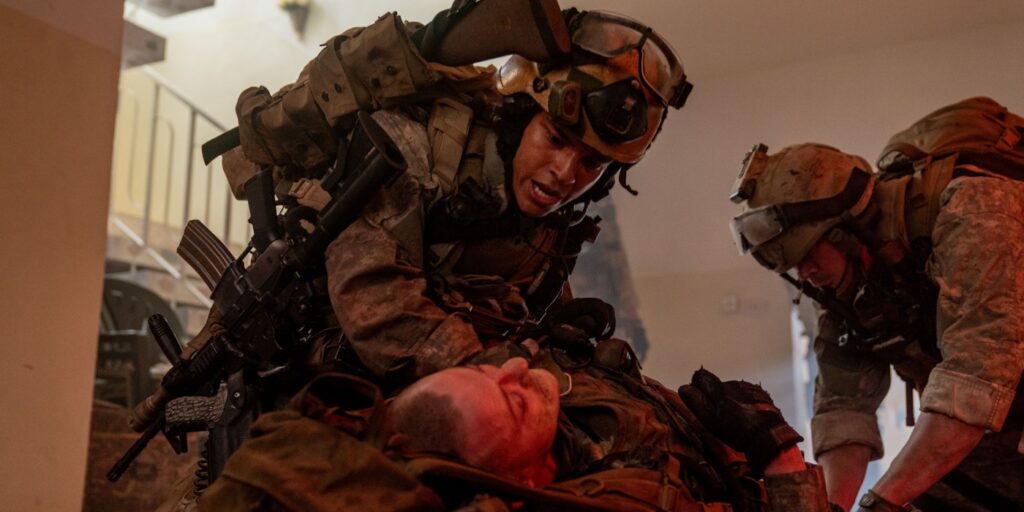Alex Garland is used to making waves. His latest co-written and directed with army veteran Ray Mendoza will continue to create ripples. Warfare is a brutal, unbearable, and physically demanding film that will engulf audiences. Seen on the biggest IMAX screen people can find, it will saturate willing participants in an unapologetic onslaught of conflict at close quarters. Pinned down by enemy fire in the Ramadi province of Iraq, American soldiers are caught off-guard observing hostiles outside. What plays out over the next 90 minutes will not only have audiences re-evaluate their understanding of war on film but bring it home in a visceral way.
Aside from a jubilant moment early on, Warfare pulls no punched in depicting the realities of being under fire or taking casualties. Joseph Quinn and an always impressive Will Poulter lead this cast, while D’Pharoah Woon A-Tai mirrors Mendoza in front of the camera. Cosmo Jarvis plays Elliott in a gruelling performance that sees him spend large chunks of Warfare unconscious, having been severely injured. The first thing that anyone will notice is the tedium. This film intentionally avoids any conventions, dwelling on routines, and makes sure that Warfare is devoid of archetypes.
Elliott remains motionless, viewing Iraq through a single sniper scope, scanning back and forth looking for potential threats. Garland keeps Jarvis in close-up, allowing audiences right in the room mere millimetres away. That sense of claustrophobia is intensified on an IMAX screen as the heat of their location starts to ramp up tensions. Not tensions in the platoon but a sense of creeping dread for anyone watching.

Image Courtesy of A24
Up until the moment Sam (Joseph Quinn) and Elliott (Cosmo Jarvis) get blown up, Warfare gets by on doing nothing dramatic. This is just a platoon of men who have been trained to act as a unit. The story is exactly what audiences can see and nothing else. There are no flashbacks, no epiphanies, and no sense of closure, even after the dust settles. Because of that, some people going into Warfare might be confused or even disappointed by a lack of apparent structure. It feels rough around the edges, has long stretches of silence, and is intentionally unheroic. However, that is the point of this film, which actively downplays any notions of war as something to be celebrated.
Some people may question the need for Warfare on film at all since it feels so personal and specific to everyone involved. It simply starts and stops without a sense of resolution, giving the film a docu-drama edge that challenges it as a work of fiction. That sense of intrusion that drives home the drama and makes audiences feel awkward; will be exactly why Warfare needs to be seen. Trying to evaluate performances without a criteria is almost impossible, especially when no one puts a foot wrong. This is an ensemble who are simply trying to tell a story and leave these men with a legacy that does them justice.
With body parts on the road outside and escalating tensions inside, every minute of Warfare matters. It might have character moments, but they are there for context. There might be injuries, but they are drawn from memory. This has no happy endings or last-minute reprieves because life never works that way. A fact that this exceptional ensemble drives home with a passion that makes Warfare instantly iconic.
Warfare is out in selected cinemas from April 18th.



